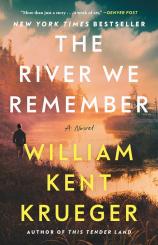The River We Remember
Review
The River We Remember
Most people reading THE RIVER WE REMEMBER will not really remember the year 1958. And even fewer will be able to relate to small-town Minnesota as William Kent Krueger depicts it. In the rural town of Jewel, many of the inhabitants are either farmers or those who support farmers by providing food at the local diner or teaching their children at the local school. Sheriff Brody Dern protects people, but his job is usually dealing with drunks. That changes on Memorial Day when the body of wealthy farmer Jimmy Quinn is found in the river.
There are several important characters here, and Krueger masterfully depicts them with all their frailties and sometimes their strengths. Brody Dern, like many of the veterans who live in Jewel, still struggles with what he saw and did and was forced to endure during the war. Connie Graff, the former sheriff, has similarly struggled with his experiences from a previous war. Many others also are dealing with their tortured histories.
"This is the kind of book that really seems to have it all: murder, small-town animosities, prejudice, loneliness, bullies, violence, broken people and families, rape, and even a bit of romance.... [Y]ou will love the twist when the perpetrator of the crime is finally revealed."
The river mentioned in the book’s title is practically another character. References to the river, its history and its personal significance to the characters become a unifying theme that runs through the novel much like the Alabaster River runs through Jewel and Black Earth County. From the settlers who slaughtered the Native Americans to the Native Americans who killed the settlers along its banks, and subsequent deaths attributable to suicide or murder, much violence has happened along or in the Alabaster River, which often looks ghostly white under a full moon.
Jimmy Quinn's body was mutilated not only by the shotgun blast that felled him but by the voracious catfish that inhabit the river. By the time his bloated body was found on the edge of the river, his face looked like a horrendous Halloween mask. His death is just the first act of violence in this tale of a hot, turbulent summer during which emotions run high and animosities run wild.
Noah Bluestone, a local of Sioux descent, worked for Quinn but had been fired in the days before Quinn's death. Bluestone wasn't the only one who might have wanted Quinn dead as most of the county hated him, including his children from both his first and second marriages. But being as the locals referred to him as "a savage Indian," Bluestone was the easiest to pin the murder on. He was in the military for 20 years before returning to Black Earth County to farm his father's small plot of land. He brought with him Kyoko, whom he met and married in Japan. Bluestone suffered in the military not only due to the color of his skin but also because he married one of the "enemy"; when he returned to Minnesota, the reception wasn't much better.
We see how Sheriff Dern's well-meaning actions upon finding the supposed location where Quinn was shot end up backfiring, and Krueger eventually shares Dern's reasoning. No one is mourning the passing of Quinn, but many of the residents of Black Earth County are intent on making Bluestone pay for the crime, even though Dern is not sure that he is the guilty party. Mysteriously, Bluestone will say nothing in his defense, nor will Kyoko share the events of that night.
This is the kind of book that really seems to have it all: murder, small-town animosities, prejudice, loneliness, bullies, violence, broken people and families, rape, and even a bit of romance. By following the investigation into Quinn's well-deserved death, we get to know those who are involved and their often sordid pasts. The characters become real in Krueger's deft hands, and we care about what happens to them. Most of them, anyway.
But the questions Krueger forces us to consider are universal ones. Are we the sum of our actions, especially the painful, shameful ones? Is everyone deserving of forgiveness? Is it alright to wipe away evidence in a homicide if the victim was a completely despicable person who had no redeeming qualities whatsoever and deserved it? How hard is it for people to forgive themselves for past actions they are ashamed of or for which they are truly regretful?
I'm definitely thinking of this book as one for a future book club I will be facilitating. My only hesitation is that the depth and breadth of issues raised here are such that a one-hour discussion might not suffice. I could probably spend almost that long just talking about the violence against dogs raised in the novel (but be assured that the dog in the story does not die!) and what it says about those who both perpetrate it and decry it.
While reading THE RIVER WE REMEMBER, if you are of a certain age (and I am), you will think about growing up in a small town with a single movie theater, a diner and long dirt roads. If you are not of a certain age, you will vicariously experience those turbulent times when tempers were high and passions and prejudice ran deep in many corners of America. And regardless of your age, you will love the twist when the perpetrator of the crime is finally revealed.
Reviewed by Pamela Kramer on September 9, 2023
The River We Remember
- Publication Date: May 21, 2024
- Genres: Fiction, Historical Fiction, Historical Mystery, Mystery
- Paperback: 448 pages
- Publisher: Atria Books
- ISBN-10: 1982179228
- ISBN-13: 9781982179229




